#Soviet heritage
Photo
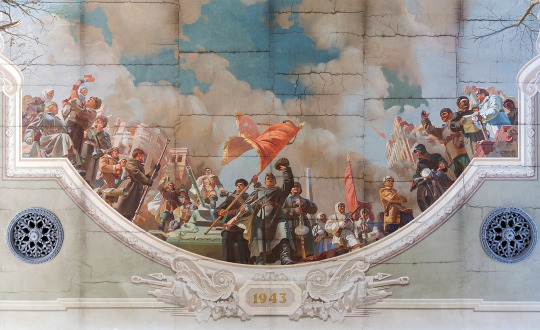
there are some cracks in this aging image
#Europe#Russian Federation#Russia#Volgograd#Soviet Art#Soviet heritage#Soviet legacy#Soviet remains#Soviet mural#Soviet painting
25 notes
·
View notes
Text
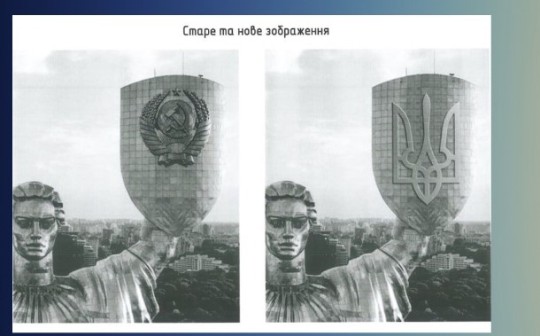
The Ukrainian authorities gave official permission for the decommunization of the sculpture "Motherland" in Kyiv. A trident will appear on the shield, which is raised over the Ukrainian capital by a giant female figure, instead of the coat of arms of the Soviet Union." - BBC Russia
i was hoping this would escape the recent wave of iconoclasm, but evidently post-soviets can't create anything of their own, they know only how to destroy.
#fuck off already#they destroy anything and everything from the socialist era and have created nothing#russians are no better in this#they rape soviet heritage by twisted nationalistic perversions#andropov would have sorted everyone out#pic
48 notes
·
View notes
Text
so tired of tankies being all ‘uwu comrade Goncharov was one of us.’ um. Susan. ‘comrade’ Goncharov fled the Soviet Union due to Stalin’s repression and became estranged from his brother due to Valery’s refusal to condemn the hypocrisy and crimes of the Soviet government. sorry if you didn’t understand the movie and if anything more complicated than Marvel characters looking at the camera and going “well that happened” and then explaining their motivations is beyond u. if u missed the anti-authoritarian message of the film that’s on u.
#also i stg if one more person erased Andrey’s Ukrainian heritage and says he's Russian im gonna lose it. when will ppl learn that#not all ppl in the Soviet Union were Russian and a lot of the were part of the Soviet Union due to the USSR's expansionism and conquest#Goncharov
87 notes
·
View notes
Text
Just watched Фишер tv-series
Not me being horny again about Ivan Yankovsky
Listen, I don't understand how but somehow we came to the point where my entire generation is in love with him, his father (+ his wife Oksana Fandera) and his grandfather (rest in peace, Oleg Yankovsky, we still miss you so much)
#before you say anything no ironically this was not a case of nepotism even though I thought it was#as it turns out Ivan had to apply to drama school several times#and the fact that he was a grandson of one of the greatest soviet actors didn't do shit. in fact it made his chances even lower.#why? well. everyone always tried to compare him to his grandfather and it was quite unfair because they're different.#so he tried to mention his heritage as few times as he could#and as time went on everyone kind of forgot that he's a grandson of Oleg Yankovsky because he made a name for himself#just like his father did once (first through directing and trust me filipp is a damn great director and then through acting too)#that's what we could call technical nepotism but not really because in reality it didn't do shit#because when it came to my country's drama schools and acting in 2000s it was definitely not a good thing#to use this 'do you know who my <...> is?'#it could affect you acting career negatively since everyone will try to conpare you to your great relative#Philipp and his son Ivan did a lot of work to come out of Oleg's shadow and I'm glad they did
2 notes
·
View notes
Link
In late 2022, a report on Belarus’s state-funded media singled out the mural in the Soly church, accusing it of “inciting national and religious hatred.” The report also claimed priests of the church “do not care about saving souls, but about returning western Belarus to Poland.”
The painting had reportedly previously been covered up by Soviet authorities, then was revealed and re-sanctified after the fall of the U.S.S.R.
#Belarus#Roman Catholic churches#Polish cultural heritage in Belarus#history#U.S.S.R.#murals#art#Belarus–Poland relations#Miracle on the Vistula#Polish-Soviet War
1 note
·
View note
Text
thought i’d share another thing i made here :’)
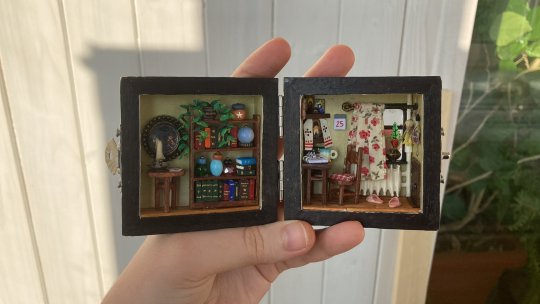
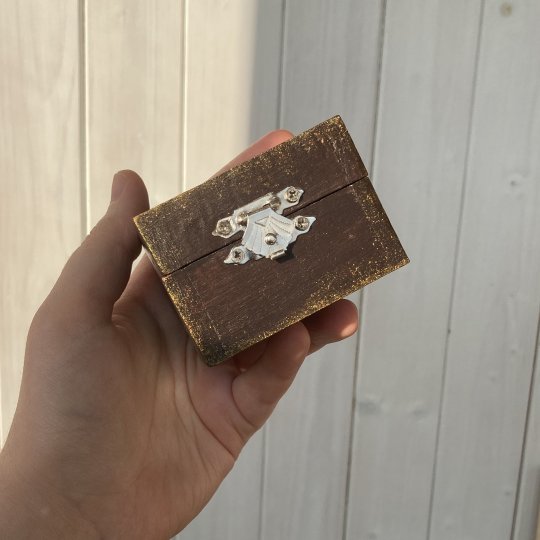
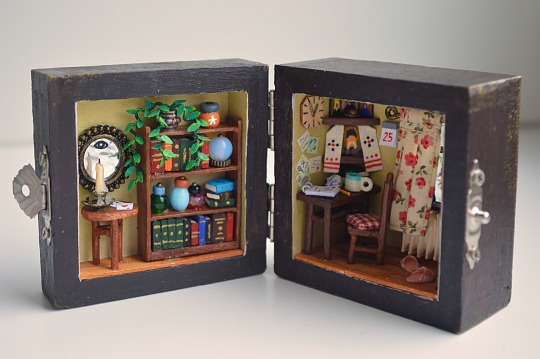
i started working on this thing back in january, as russian troops were gathering around our borders, and i got around to finishing it a couple months later, after they retreated from kyiv and my lucky family and i were able to get back home.
for half of the process i was asking myself, “is making this even worth it if it’s going to be bombed to ashes in a couple of weeks?” (the answer was yes); for the other half, i was asking myself how and why do you even make a house now that there are dead and gutted houses all around (the answer was “well, what else is there to do anyway”).
was aiming for the “small ukrainian granny’s apartment” vibe with soviet era “ugly 70s brown” color furniture and a bit of a witchy/magical realism touch :’) details + a bit of ukrainian folk trivia below!
featuring:
a little pot with a star in it, because stealing stars from the sky and storing them in pots for their evil little purposes is a classic ukrainian witch thing;
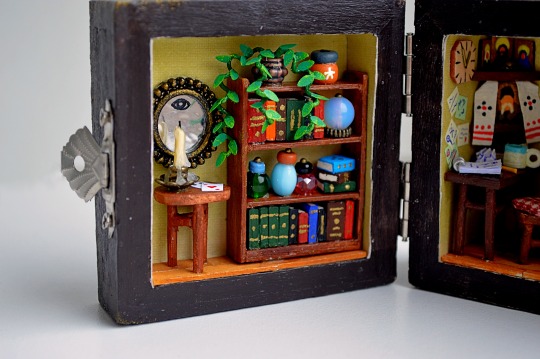
eastern orthodox icons, because every respectable ukrainian granny has those in her house + massive church-sanctioned witch hunts were never really a thing in ukraine and a witch is likely to have as amiable a relationship with god and saints and angels as with chorts (demons);
portrait of taras shevchenko, adorned with a rushnyk, because, again, can not be a proper granny apartment without those;
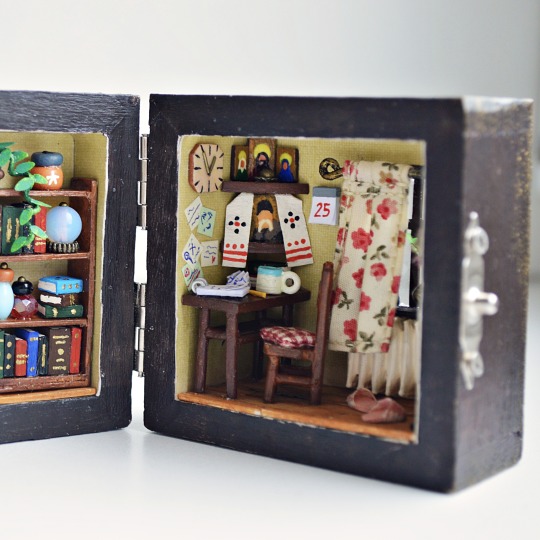
a blooming fern, because fern bloom is a Thing in ukrainian folklore (leads you to a hidden treasure, protects you from evil magic, brings you good luck, all that stuff);
a calendar booklet. it has recipes, farming + (dubious) medical advice, lame granny jokes, and shows February 25, because we’re still stuck in February 24 and hoping for the next day to arrive;
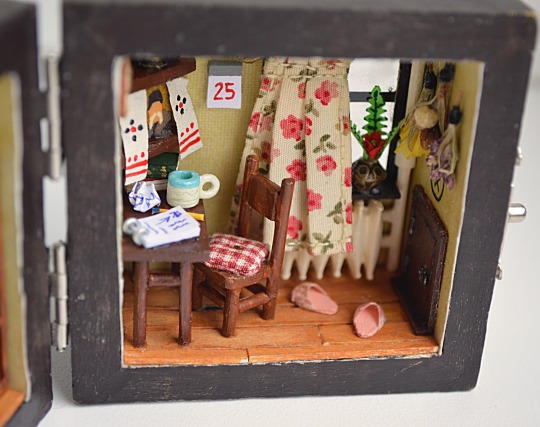
a mysterious tiny door. that rune means “heritage,” and i thought that a witch’s inheritance would warrant a little spooky door to keep it safe (also, our heritage is precisely what russia is trying to take away from us right now, so the concept has a special meaning to me);
fashionable pink slippers!
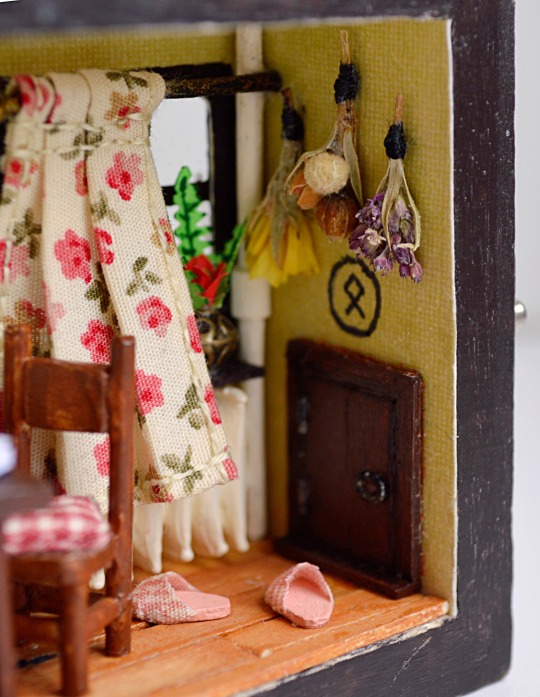
bonus: a CREATURE


#mari makes#miniature#diorama#ukraine#witch#ukrainian folk#ukrainian art#taras shevchenko#rushnyk#lots of tags bc i want attention
20K notes
·
View notes
Text
Yes it's more like cold war ii. Things we thought were resolved creeping back to the surface.
#russia#they have some heritage from imperial times too#former soviet states#nato getting russia?#we werent even thinking about them#they have nukes after all#turns out more rogue than we thought#"grievances#want to be imperial power again and entitled to it i see
0 notes
Text
Oh, Just a Decaying Soviet City in the Middle of the Sea- Messy Nessy Chic
From the mid-20th century on, and throughout the uproar of the rise and fall of the Soviet Union and beyond, this city has defied convention and stood its ground in the sea. In a country known for its industrial output Neft Daşları has been a curiosity of

View On WordPress
1 note
·
View note
Text
What is a Russian Character and How to write them
As @sarapaprikas-blog and I were working on this post, we noticed a gap of knowledge and public perception that we want to address. Plenty of characters get labelled as Russian in media without necessarily being Russian. On the other hand the Archetypal ”Russian” character often does not mirror the realities of being Russian. We are to talk about that.
What is Russia?
Russia is a country. It is the largest country in the world with over 140 million inhabitants, stretching over 11 time zones. It is often seen as the successor state to the Soviet Union, which in itself was the successor state of the Russian Empire. The Soviet Union and Russia do not have the same borders or government. However, modern Russia draws a lot from its history as the largest and dominant part of the Soviet Union. Before the Soviet Union, the area was governed by the Russian Empire. The Russian Empire, as the name already indicates, was imperialist. The history as an Empire with massive expansion, colonies and conquering different people, is arguably the biggest reason why modern Russia is as big as it is today.
What is Russian?
There is a difference between the language Russian, the ethnicity Russian, and the nationality Russian. In English the difference can be made out only by context.
Who is Russian?
As aforementioned, there is a difference between Russian (Россиянин) meaning citizen of Russia, and ethnically Russian (Русские). The term Russian (Русские) usually refers to ethnicity, indicating a person who has Russian roots. Russian (Россиянин) implies Russian citizenship, regardless of ethnicity. Thus, a Russian can be someone with Russian citizenship, but not all Russian citizens are Russians in the ethnic sense. Also, not all ethnic Russians have Russian citizenship or live within Russia.
Ethnic-Russians are an East Slavic people. Obviously, they mainly live in Russia. But there are also large communities in Ukraine, Kazakhstan, Belarus, Latvia, Lithuania, and other countries. The traditional religion among Russians is Orthodox Christianity. The main language is Russian.
The country Russia is home to more than 190 ethnicities, including indigenous and autochthonous people, leading to a variety of languages, religions and practiced cultures. So, someone who holds a Russian citizenship, has ethnic Russian heritage and / or speaks Russian, can look very different than the cliche Russian bond girl or evil-doer indicates. That also means that those who get labelled Russian can live very different lives. Writing a Russian character gives you a lot of room outside of the prevalent stereotyped depictions.
Who is not Russian?
Simple - those who say they are not Russian, are not Russian.
Who are Slavs? What is Slavic?
The slavic people are a variety of people, ethnically Russian people are part of that group. However, there are a lot of other ethnic groups that are Slavs without being Russian e.g. Poles, Sorbs, Czech, Ukrainians, and many more. Slavic is the corresponding adjective to Slavs. It is often used to describe the indo-Slavic language group. Slavic is also often used to describe the collectively perceived similarities of Slavic peoples' culture. However, that can be misleading and get’s often orientalised as not everything from Eastern-Europe or Russia is slavic.
Russian vocabulary
Да - Yes
Нет - No
Привет - Hi
Здравствуйте - Hello
Как дела ? - How are you?
Хорошо - Good
Пожалуйста - Please
Не за что - my pleasure
До свидания - Goodbye
Пока - bye
Увидимся - See you later
Хорошего дня - Have a nice day
Простите - I'm sorry. (Plural or honoured addressee)
Помогите, пожалуйста. - Help me please. (Plural or honoured addressee)
Доброе утро - Good morning
Доброй ночи - Good night.
Добрый день - Good day / afternoon.
Pet names in Russian
About pet names. They are either masculine of feminine . Please don't use words like darling, kitten, baby, pretty, sweetie, little one, little fox, etc. as they sound really strange in translation to native speakers.
Pet names are common for close ones (family, close friends, spouses). Sometimes primary school teachers call students by affectionate names. Also sweet old lady may call you ( Дорогой/ Дорогая). But outside of that nobody calls each other by pet names, only using names because Russians are very reserved and private people in general.
Gender neutral pet names:
жизнь моя - my life
солнце мое - my sun or my sunshine
ты мое все - you my everything.
лучик - sunray.
мое сокровище - my treasure.
мое золотце - my gold or sweetheart.
моя любовь - my love.
ты моя радость - you are my joy.
ангелочек - Angel.
прелесть моя - my precious.
Queerness and gender-neutral speech in Russian
Being queer in Russia is hard as queers face oppression. Because of that, there is limited to no public discourse on how to adapt and diversify the language to include queer and especially non-binary identities. This is a problem as the Russian language is extremely gendered and expresses a gender binary in near default. While gender neutral pronouns in Russian exist, it's harder to use them in real life as the neutral pronoun “оно” is mostly associated with things or animals and not living humans, similar to the English “it”.
Often words generally do not have gender neutral alternatives. However, one way we suggest for a more gender neutral speech is to avoid most explicit gendering as the flexible syntax in combination with using plural pronouns in Russian allow for more gender neutral speech.
For Example:
Я люблю их всем моих сердцем - I love them with all my heart.
Расскажи мне о них! - Tell me about them.
Дай им время- give them time.
Я горжусь ими - I'm proud of them.
Они сделает это сами - they do it themselves.
Read more about queerness in Russia here: one two three four
Russian swearing
In Russia, swearing is considered a sign of rudeness and poor manners. Use accordingly.
Also, as mentioned here, Russian syntax and inflection are different from English. Meaning one word can be a whole sentence. We punctuated every swearing that is technically a whole sentence and therefore can stand on its own grammatically.
Блять - fuck
Пошел нахуй. - fuck you
Хуй - dick
Пизда - cunt
Мы в пизде. - we are fucked / “We are stuck in the cunt.”
Ебать - fuck
Ахуел. - are you/they crazy?!
Это пиздец. - this fucked up
Мудак - asshole
Завали ебало. - shut the fuck up
Сука - bitch
Черт - damn
Непизди. - stop fucking lying. / Cut your bullshit.
Пиздобол - Person who lies a lot/ Don't lie
Мамку твою ебал. - i fucked your mom (mostly used by middle schoolers, here in grammatically masculine gender.)
Заебись. - holy shit (could be bad or good depend on situation)
Похуй! - I don't fucking care.
Навешать пиздюлей - to beat up someone.
Срать тебе в рот - To crap in your mouth.
Ты ебанулся. - Are you batshit crazy.
Заебал. - I'm sick of you.
Жопа - ass.
Иди в баню. - soft version of Иди нахуй.
Explanation of the Russian Naming System & Patronyms
The Russian naming system consists of three main elements: first name, patronymic and last name.
Name: This is the first name given to a child at birth. In Russia, the names are chosen by the parents or relatives of the child. Names can be both traditional (Alexander, Anna, Ekaterina) and modern (Sofia, Victoria, Yaroslav).
Patronymic: this is the second name, which reflects the child's origin from his father. Some cultures in Russia also use the mothers name. The patronymic name among Russian people arose in the 10th - 11th centuries and was used infrequently at first, but became widespread around the 16th century. It is formed by adding the suffix "-ovich" or "-aries" to the father's name. For example, if the father's name is Ivan, then his child Ivan or Ivanna will be called Ivan Ivanovich or Ivanna Ivanovna.
Last name: This is a family surname that is passed down from generation to generation. It is usually assigned at birth and does not change without special circumstances. Surnames can come from various sources, such as profession, place of residence, origin, or personal characteristics.
As a result, a person's full name consists of a first name, a patronymic (if applicable) and a last name, for example: Ivan Ivanovich Petrov.
How to respectfully address a person in Russian.
In Russian there are two ways to address someone. Using the polite you (Вы) amd using the formal you (Ты). The choice of mode depends on how well you know the other person and whether you are superior or inferior in terms of age and social position. If you know the person's first name you refer to them by first name and patronymic. For examples:
Борис Юрьевич, Ваши рабочие отлично справились с ремонтом- Boris Yurievich, your workers did a great job with repairs.
Adults never address a person by name, only by surname or patronymic unless the addressee gives permission to address them in an informal manner.
Regulations of most military require their members address each other in formal you( Вы ); subordinates address commanders as товарищ (comrade) + rank , while higher ups address subordinates by military rank and surname. Example:
[Colonel to Sgt. Sidorov] Сержант Сидоров, ко мне!
Sergeant Sidorov, front and center!
[sgt. Sidorov to colonel] По вашему приказанию прибыл, товарищ полковник!
Reporting for duty [lit. arrived at your (pl.) request], comrade colonel!
Military men sometimes use same forms of address, albeit in singular, in friendly conversation. Example:
Сержант, дай сигарету. - Give (sing.) me a cigarette, Sarge.
Military hierarchy in Russia
You can find useful links here. One Two
#könig#sarapaprikasblog#nikto#call of duty 3#call of duty modern warfare 3#creative writing#nik cod#nikolai belinski#cod#cod modern warfare#gromsko#call of duty#gromsko cod#sobiesław kościuszko#grimmwriting#sebastian krueger
252 notes
·
View notes
Text
Russian missile attack destroys Odesa's Transfiguration Cathedral.
The cathedral was hit in an overnight missile attack that killed one civilian and injured 18 others, including four children.
On July 21, UNESCO condemned the Russian military attacks on Odesa's historic center, named a world heritage site earlier this year. UNESCO listed "religious buildings" as among the reasons the city center deserved this designation. The Transfiguration Cathedral was founded in 1794. The original building was destroyed by Soviet forces in 1936, and the new cathedral was established in 2003.
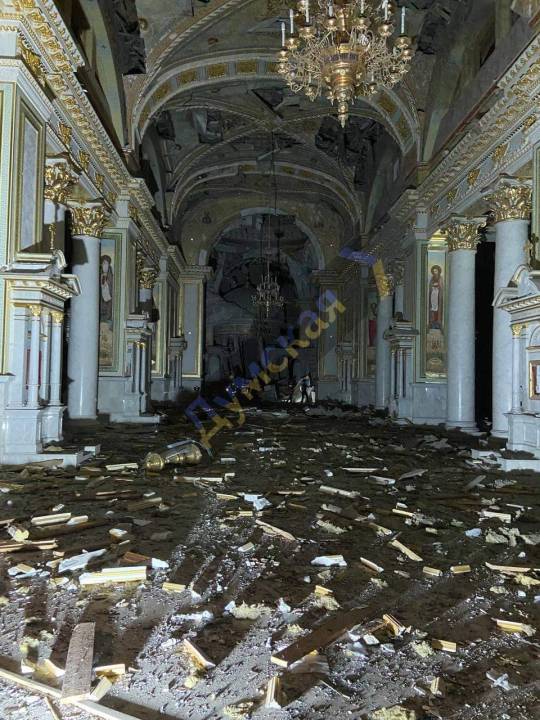
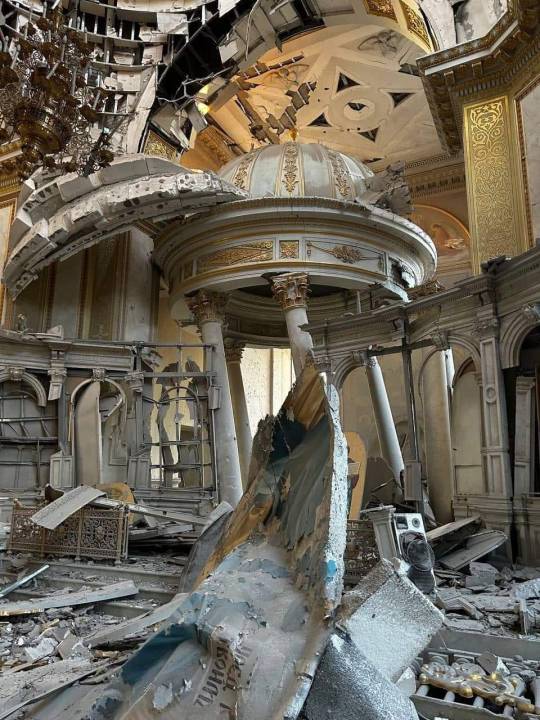
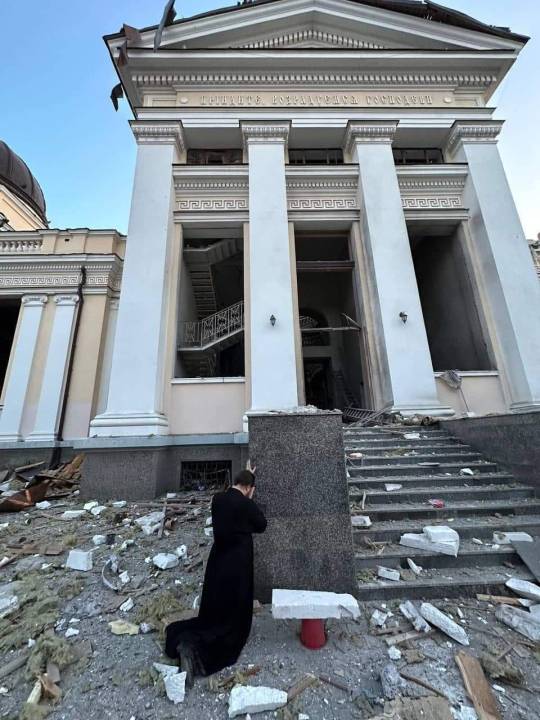
#ukraine#украина#україна#russia#россия#росія#putin#путин#путін#война#war#odesa#odessa#війна#одеса#одесса#UNESCO#Cathedral#orthodox#religion#history#ussr#stalin
582 notes
·
View notes
Photo
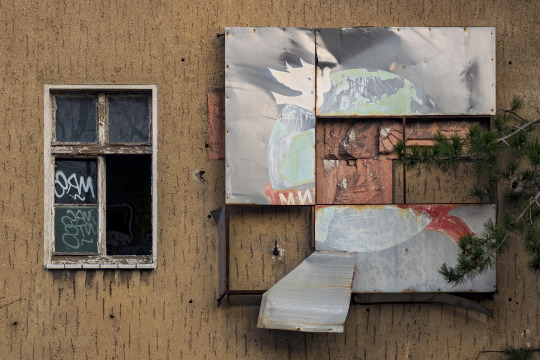
Layers of violent history — what is left afterall?
#Europe#Germany#Saxony#Leipzig#Möckern#Gohlis#NS Art#NS remains#NS legacy#NS heritage#Soviet Art#Soviet remains#Soviet legacy#Soviet heritage
2 notes
·
View notes
Text
ok malding session over, it has now subsided to a low temperature seething for the next few weeks.
#i hate post-soviet societies so much#historical revisionism and the blind destruction of cultural heritage is too much#a century from now we will know that this was wrong#txt
1 note
·
View note
Text
I often hear comments about Crimea and the other territories occupied by Russia being the “price of peace” in Ukraine. I, like many Crimean Tatars and Ukrainians, know that rewarding aggression and brutal occupation does not bring peace.
Crimea is not Russian to be “given back” to Russia. It never was. It never will be.
It is the homeland that has been repeatedly, brutally taken from us; it is the homeland we will not stop fighting for.
My grandmother, Shevkiye, was just 11 years old when on May 18, 1944, Soviet soldiers barged into her home at five o’clock in the morning. World War II was still raging and the Soviet regime had just accused the Crimean Tatars of collaborating with the enemy, the German Nazis – a baseless allegation that led to the unimaginable horror of genocide by deportation.
My great-grandfather was at the front, fighting those same Nazis whom he was accused of collaborating with. So the Soviet soldiers found at home just his wife and four children – the youngest one only a few months old. The soldiers gave them 15 minutes to gather their belongings and did not stop hitting my great-grandmother with their guns as she struggled to pack.
They marched them out of the house and – along with other families from their home village of Ayserez – hoarded loaded them onto a train meant for transporting cattle. The wagons were packed with people and there were no toilets on them; people struggled to breathe. No food or water was provided on the long journey, during which my grandmother’s family remained unaware of their destination.
Exhausted and starved, they focused solely on survival as hunger and disease killed many along the way. One of the most traumatising memories of the journey for my grandmother was witnessing a pregnant woman give birth on the train and then pass away shortly after. A Soviet soldier threw her body out of the wagon while the train kept moving.
After 20 days on the train, they finally arrived at Golodnaya Steppe station in the Mirzachul region of Uzbekistan, where they were unceremoniously unloaded onto a scorching hot platform. With no money or support, they struggled to survive in this unknown land.
They settled in a dilapidated barrack with no roof, windows, or doors. Their food consisted of grass, nettle, potato peels, and rotten potatoes; their drinking water came from irrigation ditches and often caused dysentery. There was no medical assistance available; the Soviet authorities clearly wanted as many Crimean Tatars to die as possible.
The forced deportation of the Crimean Tatars to Central Asia resulted in the death of 46 percent of the population, leaving a gaping wound in the hearts of those who survived. It was the culmination of a century and a half of deliberate and systematic destruction of the Crimean Tatar people, heritage and culture after the subjugation of the Crimean state by Russian imperial forces in the late 18th century. It is on this obliteration of the Crimean Tatars that the bloody myth of Crimea as a “Russian territory” was built.
598 notes
·
View notes
Text
just a very quick explanation about eastern european melancholy because it seems important to me -- this term as well as the general concept of melancholy can often be found in art and literature analysis and basically describes how the general depiction of eastern europe is... less than favourable. for example, eastern european characters like in bram stoker's dracula are characterised as being distincly different and not as culturally advanced compared to "modern" western cultures, a trend that is sometimes still seen today when looking at cultural stereotypes.
in the context of the movie damon and kris watched as well as historically, this term now more often refers to a general feeling of hopelessness that is caused by unstable political as well as economic conditions due to the situation post wwii and then the dissolution of the soviet union as well as yugoslavia.
the fact that damon and kris both felt that it was important to illustrate this cultural aspect not just through art but by choosing to evoke a female figure, a slavic babushka, means a lot to me, personally. i was joking with @izpira-se-zlato that damon made kris look like my grandma -- but, as with a lot of people here i assume, my grandma was born in post-war eastern europe and was a young girl during the same time period this movie takes place in and was also forced to experience and live through a lot of hardships in early communist poland.
i do believe that kris feels a strong connection to his slavic heritage and culture (he was the one rambling about interslavic, after all) and the fact that damon felt something, too, while watching the movie and that they wanted to express it together is something that feels very, very important to me and i honestly love and appreciate them so much for doing that.
#joker out#i enjoyed the memes but i was also having a breakdown because this is so very important to me#sometimes i realise i have a degree that is indeed also focused on culture and not just literature can you believe#i guess the meaning is also very very apparent for a lot of slavic people here because well#we all live(d) through it#there's a reason why my parents emigrated#anyway#kris guštin#damon baker
137 notes
·
View notes
Text

Я піду в далекі гори, на широкі полонини
І попрошу вітру зворів, аби він не спав до днини
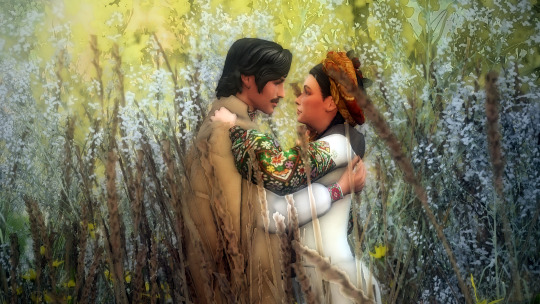
Щоб летів на вільних крилах на кичери і діброви
І дізнавсь, де моя мила - карі очі, чорні брови
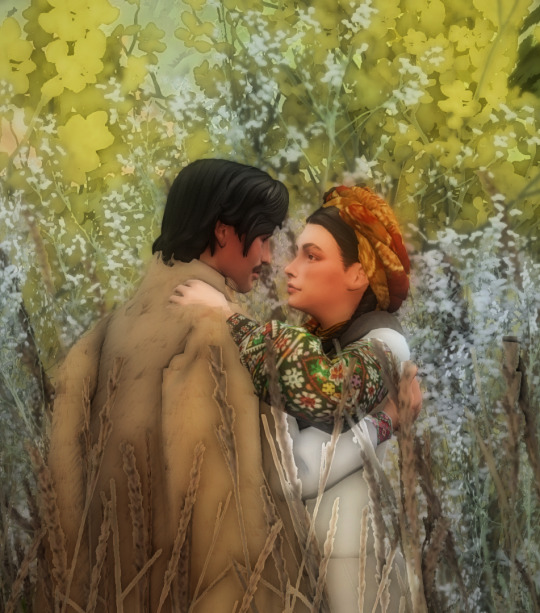
Мила моя, люба моя, світе ясен цвіт
Я несу в очах для тебе весь блакитний світ
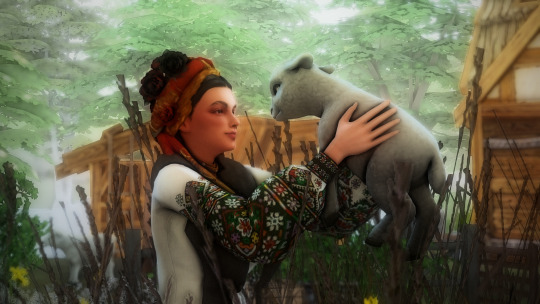

Я несу любов-зажуру, мрію молоду
І сади цвітуть для мене, як до тебе йду
Shadows of Forgotten Ancestors (1964)
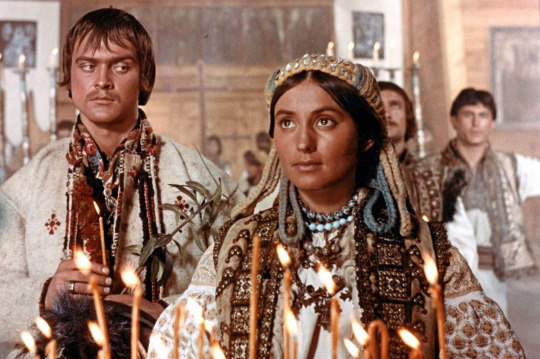
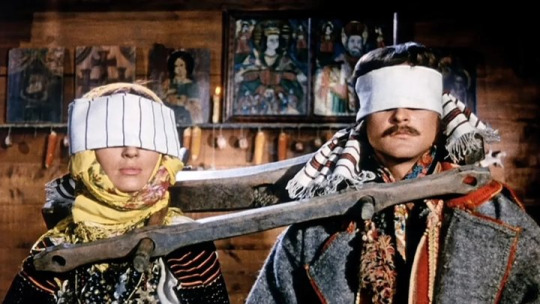
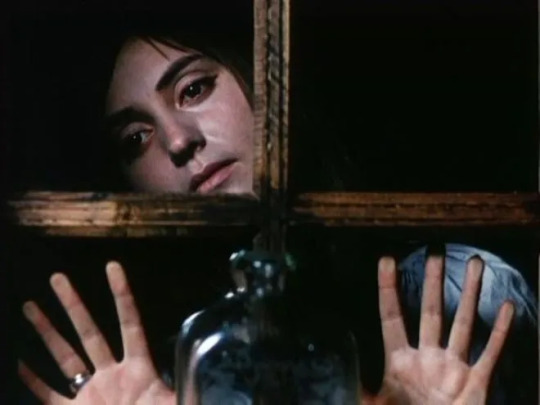
The masterpiece of Ukrainian cinema was stolen by the russians and presented at the 'russian film festival' in France as part of the russian heritage.
- a novel written by the Ukrainian author
- tells a love story of the oldest ethnographic group of Ukrainians - the Hutsuls
- reflects ancient Ukrainian customs and folklore
- filmed by an Armenian convicted by the soviet union for Ukrainian nationalism
Yeah, that's indeed some 'russian' movie right here. Hey Europe. You're SO concerned about cultural appropriation. Why then do you close your eyes to this vandalism and make excuses?
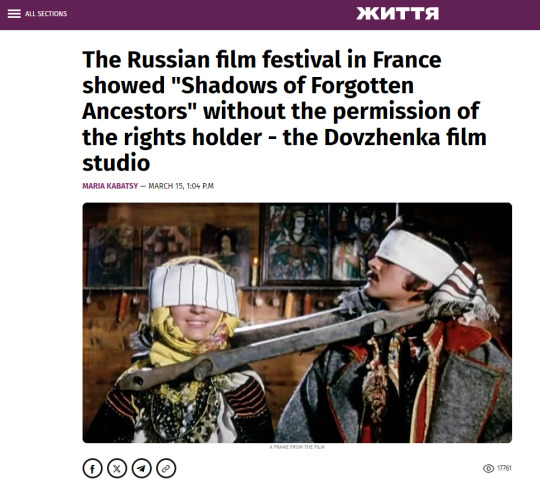
Continue to cut Ukrainians out of Oscars and your cultural life. But then don't be surprised by russian tanks under your windows. Culture is as much a stepping stone to expansion as military power. It's a pity that in 30 years the world still haven't realized this.
#sims#the sims 4#sims 4#ts4#sims 4 historical#sims 4 scenery#sims 4 screenshots#ukrainian culture#culture appropriation#ukrainian traditions#russia is a terrorist state#stop russia#film festival#cinema
66 notes
·
View notes
Text
people you meet in russian class
kid who knows a ton of molchat doma and kino songs, but keeps forgetting how to say "hello"
heritage speaker who knows vocab but not grammar rules, who's besties with the language fiend who knows grammar but not vocab (this was my friend and I)
kid with scary politics
bored tech genius who speaks russian with the thickest american accent you've ever heard
the alt/goth kid. there's always one.
the one who always shows up late and gets called out by the professor every time
the one who dropped out as soon as they heard about genitive case
retired old guy who was in the military and is awkwardly singing cheburashka songs in the back of the classroom with the rest of the students
humanities student intimidated by all their stem and polsci classmates (this was also me)
"cyka blyat lol edgy communism memes" kid who really wants to commit to the bit
quiet slavic kid who never talks but is somehow tight with the professor
the one a little too into soviet history
the one who never tried to learn to read cyrillic
the one who insists on writing in russian cursive, despite the fact that none of the other students can read it and the professor keeps correcting it (this was also me. we didn't even have to learn cursive. I just wanted to learn it for historical research purposes)
the one romanov apologist (may also believe they're a reincarnation of anastasia romanova)
#language learning#russian#russian language#I miss russian class. I made so many friends. and the professor loved me so it was awesome#she also made us tea and pirozhki sometimes
54 notes
·
View notes